- Home
- Philip Roth
The Humbling Page 2
The Humbling Read online
Page 2
In their conversation, everything private was revealed easily and shamelessly; suicide seemed like a very huge aim and living a hateful condition. Among the patients he met, there were some who knew him right off because of his handful of movies, but they were too immersed in their own struggles to take much more notice of him than they did of anyone other than themselves. And the staff was too busy to be distracted for long by his theatrical renown. He was all but unrecognizable in the hospital, not only to others but to himself.
From the moment that he had rediscovered the miracle of a night’s sleep and had to be awakened for breakfast by the nurse, he began to feel the dread subside. They had given him one medication for depression that didn’t agree with him, then a second, and finally a third that caused no intolerable side effects, but whether it did him any good, he could not tell. He could not believe that his improvement had anything to do with pills or with psychiatric consultations or group therapy or art therapy, all of which felt like empty exercises. What continued to frighten him, as the day of his discharge approached, was that nothing that was happening to him seemed to have to do with anything else. As he’d told Dr. Farr—and further convinced himself by having tried to the best of his ability to search for a cause during their sessions—he had lost his magic as an actor for no good reason and it was just as arbitrarily that the desire to end his life began to ebb, at least for the time being. “Nothing has a good reason for happening,” he said to the doctor later that day. “You lose, you gain—it’s all caprice. The omnipotence of caprice. The likelihood of reversal. Yes, the unpredictable reversal and its power.”
Near the end of his stay he made a friend, and each night they had dinner together she repeated her story to him. He had met her first in art therapy, and after that they would sit across from each other at a table for two in the dining hall, chatting like a couple on a date, or—given the thirty-year age difference—like a father and daughter, albeit about her suicide attempt. The day they met—a couple of days after her arrival—there had been only the two of them in the art room along with the therapist, who, as though they were kindergarteners, had handed each sheets of white paper and a box of crayons to play with and told them to draw whatever they wanted. All that was missing from the room, he thought, were the little tables and chairs. To satisfy the therapist, they worked in silence for fifteen minutes and then, again for the sake of the therapist, listened attentively to the response each offered to the other’s drawing. She had drawn a house and a garden, and he a picture of himself drawing a picture, “a picture,” he told the therapist when she asked him what he’d done, “of a man who has broken down and who commits himself to a psychiatric hospital and goes to art therapy and is asked there by the therapist to draw a picture.” “And suppose you were to give your picture a title, Simon. What would it be?” “That’s easy. ‘What the Hell Am I Doing Here?’”
The five other patients scheduled to be at art therapy either were back on their beds, unable to do anything except lie there and weep, or, as though an emergency had befallen them, had rushed off without an appointment to their doctors’ offices and were sitting in the waiting room preparing to lament over the wife, the husband, the child, the boss, the mother, the father, the boyfriend, the girlfriend—whomever it was they never wanted to see again, or whom they would be willing to see again so long as the doctor was present and there was no shouting or violence or threats of violence, or whom they missed horribly and couldn’t live without and whom they would do anything to get back. Each of them sat waiting a turn to denounce a parent, to vilify a sibling, to belittle a mate, to vindicate or excoriate or pity themselves. One or two of them who could still concentrate—or pretend to concentrate, or strain to concentrate—on something other than the misery of their grievance would, while waiting for the doctor, leaf through a copy of Time or Sports Illustrated or pick up the local paper and try to do the crossword puzzle. Everybody else would be sitting there gloomily silent, inwardly intense and rehearsing to themselves—in the lexicon of pop psychology or gutter obscenity or Christian suffering or paranoid pathology—the ancient themes of dramatic literature: incest, betrayal, injustice, cruelty, vengeance, jealousy, rivalry, desire, loss, dishonor, and grief.
She was an elfin, pale-skinned brunette with the bony frailty of a sickly girl of about a quarter her age. Her name was Sybil Van Buren. In the eyes of the actor hers was a thirty-five-year-old body that not only refused to be strong but dreaded even the appearance of strength. And yet, for all her delicacy, she’d said to him, on the way up the path to the main residence hall from art therapy, “Will you eat dinner with me, Simon?” Amazing. Still some kind of wish in her not to be swallowed up. Or maybe she’d asked to stay on at his side in the hope that with a little luck something would ignite between them that would complete the doing in of her. He was big enough for the job, more than whale enough for a tiny bundle of flotsam like her. Even here—where, without assistance from the pharmacopoeia, any show of stability, let alone bravado, was unlikely to quell for long the maelstrom of terror swirling back of the gullet—he had not lost the loose, swaggering gait of the ominous man that had once gone toward making him such an original Othello. And so, yes, if there was still any hope for her of going completely under, perhaps it lay in cozying up to him. That’s what he thought at the outset anyway.
“I had lived for so long in the constraints of caution,” Sybil told him at dinner that first night. “The efficient housewife who gardens and sews and can repair everything and throws glorious dinner parties as well. The quiet, steady, loyal sidekick of the rich and powerful man, with her unambiguous, wholehearted, old-fashioned devotion to the rearing of children. The ordinary existence of an insignificant mortal. Well, I went off to go shopping for groceries—what could be more mundane than that? Why would anyone in the world have to worry about that? I’d left my daughter playing out back in the yard and our little boy upstairs sleeping in his crib and my rich and powerful second husband watching a golf tournament on TV. I turned around and came home because when I got to the supermarket I realized I’d forgotten my wallet. The little one was still sleeping. And in the living room the golf game was still going, but my eight-year-old daughter, my little Alison, was sitting up on the sofa without her underpants and my rich and powerful second husband was kneeling on the floor, his head between her plump little legs.”
“What was he doing there?”
“What men do there.”
Axler watched her cry and said nothing.
“You’ve seen my artwork,” she finally told him. “The sun shining down on a pretty house and the garden all in bloom. You know me. Everybody knows me. I think the best of everything. I prefer it that way and so does everyone around me. He got up off his knees, completely unruffled, and told me that she had been complaining about an itch and she wouldn’t stop scratching herself, and so, before she did herself any harm, he had taken a look to be sure she was all right. And she was, he assured me. He could see nothing, not a blemish, not a sore, not a rash . . . She was fine. ‘Good,’ I said. ‘I came back for my wallet.’ And instead of getting his hunting rifle from the basement and pumping him full of bullets, I found my wallet in the kitchen, said ‘Bye again, everyone,’ and went off to the store as if what I had witnessed was a commonplace occurrence. In a daze, dumbfounded, I filled two shopping carts. I would have filled two more, four more, six more if the store manager hadn’t seen me blubbering away and come over to ask if I was all right. He drove me home in his car. I left our car in the lot there and was driven home. I couldn’t negotiate the stairs. I had to be carried up to bed. There I lay for four days, unable to speak or eat, barely able to drag myself to the bathroom. The story was that I’d come down with a fever and been ordered to bed. My rich and powerful second husband could not have been more solicitous. My little darling Alison sweetly brought me a vase of cut flowers from my garden. I could not ask her, I could not bring myself to say, ‘Who removed your underpants? What do yo
u want to tell me? If you really had some kind of itch, you would have waited, wouldn’t you, until I came home from shopping to show me? But, dear, if you didn’t have an itch . . . dear, if there’s something you’re not telling me because you’re afraid to . . . ?’ But I was the one who was afraid. I could not do it. By the fourth day I had convinced myself that I had imagined everything, and two weeks later, when Alison was at school and he was at work and the little one was taking his nap, I got out the wine and the Valium and the plastic garbage bag. But I couldn’t stand suffocating. I panicked. I took the pills and the wine but then I remember not getting any air and hurrying to rip the bag off. And I don’t know what I regret more horribly—having tried to do it or having failed to do it. All I want to do is shoot him. Only now he’s alone with them and I’m here. He’s all alone with my sweet little girl! It can’t be! I called my sister and asked her to stay at the house with them, but he wouldn’t let her sleep there. He said there was no need. And so she left. And what can I do? I’m here and Alison’s there! I was paralyzed! I did nothing that I should have done! Nothing that anyone would have done! I should have rushed the child to the doctor! I should have called the police! It was a criminal act! There are laws against such things! Instead I did nothing! But he said nothing had happened, you see. He says that I’m hysterical, that I’m deluded, that I’m mad
—but I’m not. I swear to you, Simon, I’m not mad. I saw him doing it.”
“That’s horrible. A horrible transgression,” Axler said. “I see why it’s done what it did to you.”
“It’s evil. I need someone,” she confided in a murmur, “to kill this evil man.”
“I’m sure you could find a willing party.”
“You?” asked Sybil in a tiny voice. “I’d pay.”
“If I was a killer I would do it pro bono,” he said, taking the hand she extended to him. “People become infected with the rage when an innocent child is violated. But I’m an out-of-work actor. I’d botch the job and we’d both go to jail.”
“Oh, what should I do?” she asked him. “What would you do?”
“Get strong. Cooperate with the doctor and try to get strong as fast as you can so you can go home to your children.”
“You believe me, don’t you?”
“I’m sure you saw what you saw.”
“Can we have dinner together?”
“For as long as I’m here,” he said.
“I knew in art therapy that you’d understand. There’s so much suffering in your eyes.”
Within months of his leaving the hospital, his wife’s son died of an overdose and the marriage of the occupationless dancer to the occupationless actor ended in divorce, completing yet one more of the many millions of stories of unhappily entwined men and women.
ONE DAY AROUND NOON a black town car pulled into the driveway and parked beside the barn. It was a chauffeur-driven Mercedes and the small white-haired man who stepped out of the back seat was Jerry Oppenheim, his agent. After the hospital internment, Jerry had phoned him every week from New York to see how he was doing, but many months had gone by without their speaking—the actor having chosen at one point to stop taking the agent’s calls along with most everyone else’s—and the visit was unexpected. He watched Jerry, who was over eighty and walked cautiously, negotiate the stone path to the front door, a package in one hand and flowers in the other.
He opened the door before Jerry even had a chance to knock.
“Suppose I hadn’t been home?” he said, helping Jerry over the sill.
“I took my chances,” Jerry said, smiling gently.
He had a gentle face altogether and a courteous demeanor that did not, however, compromise his tenacity in behalf of his clients. “Well, you seem all right physically, at least. Except for that hopeless look on your face, Simon, you don’t look bad at all.”
“And you—neat as a pin,” Axler said, having himself neither changed his clothes nor shaved for days.
“I brought you flowers. I brought us a box lunch from Dean and DeLuca. Have you had lunch?”
He hadn’t even had breakfast, so he merely shrugged and took the gifts and helped Jerry out of his coat.
“You drove up from New York,” he said.
“Yes. To see how you’re doing and talk to you face-to-face. I have news for you. The Guthrie is doing Long Day’s Journey. They called to ask about you.”
“Why me? I can’t act, Jerry, and everyone knows it.”
“Nobody knows any such thing. Perhaps people know that you had an emotional setback, but that doesn’t set you apart from the human race. They’re doing the play next winter. It gets awfully cold out there, but you’d be a wonderful James Tyrone.”
“James Tyrone is a lot of lines that you have to say, and I can’t say them. James Tyrone is a character that you have to be, and I can’t be him. There’s no way I can play James Tyrone. I can’t play anyone.”
“Look, you took a tumble in Washington. That happens to practically everyone sooner or later. There’s no ironclad security in any art. People run into an obstacle for reasons no one knows. But the obstacle is a temporary impediment. The obstacle disappears and you go on. There isn’t a first-rate actor who hasn’t felt discouraged and that his career was over and that he was unable to come out of the bad period he was in. There isn’t an actor who hasn’t gone up in the middle of a speech and not known where he was. But every time you go out on the stage there’s a new chance. Actors can recover their talent. You don’t lose the skills if you’ve been out there for forty years. You still know how to enter and sit down in a chair. John Gielgud used to say that there were times he wished he were like a painter or a writer. Then he could retrieve the bad performance he gave that evening and take it out at midnight and redo it. But he couldn’t. He had to do it there. Gielgud went through a very bad time when he could do nothing right. So did Olivier. Olivier went through a terrible period. He had a terrible problem. He couldn’t look any of the other actors in the eye. He told the other actors, ‘Please don’t look at me, because it’ll throw me.’ For a while he couldn’t be alone on the stage. He said to the other actors, ‘Don’t leave me alone out there.’”
“I know the stories, Jerry. I’ve heard them all. They don’t have to do with me. In the past I never had more than two or three bad nights when I couldn’t recover. For two or three nights I would think, ‘I know I’m good, I’m just not doing it.’ Maybe nobody in the audience knew it, but I knew it—it wasn’t there. And on those nights when it isn’t there for you it’s a labor, I know that, and yet somehow you get by. You can get very good at getting by on what you get by on when you don’t have anything else. But that’s something different entirely. When I had a truly wretched performance, I would lie awake all night afterward thinking, ‘I’ve lost it, I have no talent, I can’t do anything.’ Hours would go by, but then all of a sudden, at five or six in the morning, I’d understand what went wrong and I couldn’t wait to get to the theater that evening and go on. And I’d go on and I couldn’t make a mistake. A beautiful feeling. There are days when you can’t wait to get there, when the marriage between you and the role is perfect and there’s never a time when you’re not happy to sail out onto the stage. Those are important days. And for years I had them one after the other. Well, that’s over. Now if I were to go out on the stage, I wouldn’t know what I was out there for. Wouldn’t know where to begin. In the old days I’d do three hours of preparation in the theater for an eight o’clock curtain. By eight I was deeply inside that role—it was like a trance, like a useful trance. In The Family Reunion I was in the theater two and a half hours before the first entrance, working up to how to enter when you are pursued by the Furies. That was hard for me, but I did it.”
“You can do it again,” Jerry said. “You’re forgetting who you are and what you’ve achieved. Your life has hardly come to nothing. Endlessly you would do things on the stage in a way I never expected, and over the years that was thrilling thousands
of times for the audience and always thrilling for me. You went as far away as possible from the obvious thing that any other actor would do. You couldn’t be routine. You wanted to go everywhere. Out, out, out, as far out as you could go. And the audience believed in you in every moment, wherever you took them. Sure, nothing is permanently established, but so is nothing permanently lost. Your talent’s been mislaid, that’s all.”
“No, it’s gone, Jerry. I can’t do any of it again. You’re either free or you aren’t. You’re either free and it’s genuine, it’s real, it’s alive, or it’s nothing. I’m not free anymore.”
“Okay, let’s have some lunch then. And put the flowers in some water. The house looks fine. You look fine. A little too slimmed down, I would say, but you still look like yourself. You’re eating, I hope.”
“I eat.”
But when they sat down to lunch in the kitchen, with the flowers in a vase between them, Axler was unable to eat. He saw himself stepping out on the stage to play James Tyrone and the audience bursting into laughter. The anxiety and fear were as naked as that. People would laugh at him because it was him.

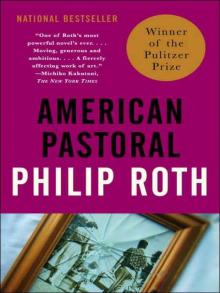 American Pastoral
American Pastoral The plot against America
The plot against America The Human Stain
The Human Stain Nemesis n-4
Nemesis n-4 Sabbath’s Theater
Sabbath’s Theater The Professor of Desire
The Professor of Desire Our Gang
Our Gang The Breast
The Breast Operation Shylock
Operation Shylock The Dying Animal
The Dying Animal Letting Go
Letting Go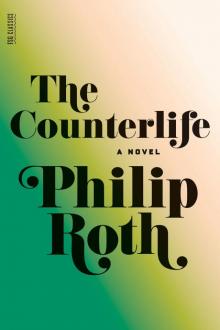 The Counterlife
The Counterlife Everyman
Everyman Nemesis
Nemesis Exit Ghost
Exit Ghost Portnoy's Complaint
Portnoy's Complaint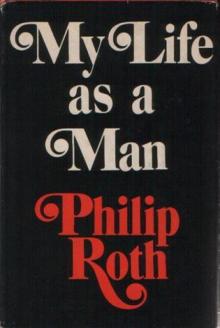 My Life as a Man
My Life as a Man I Married a Communist
I Married a Communist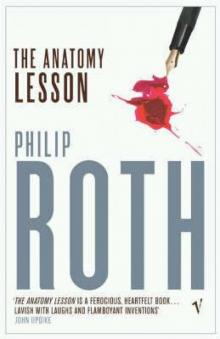 The Anatomy Lesson
The Anatomy Lesson The Great American Novel
The Great American Novel Shop Talk
Shop Talk The Humbling
The Humbling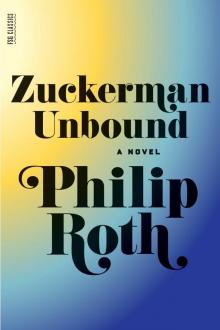 Zuckerman Unbound
Zuckerman Unbound When She Was Good
When She Was Good The Prague Orgy
The Prague Orgy American Pastoral (Nathan Zuckerman)
American Pastoral (Nathan Zuckerman) Goodbye, Columbus
Goodbye, Columbus Reading Myself and Others
Reading Myself and Others